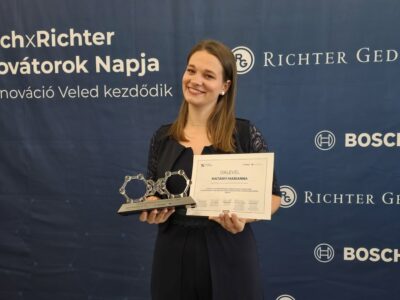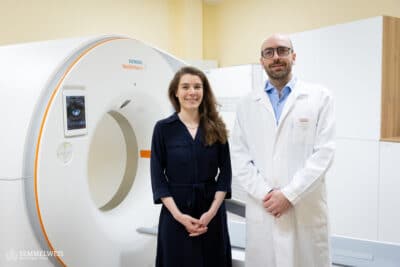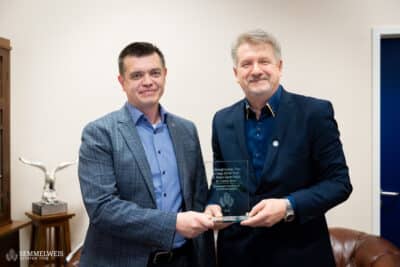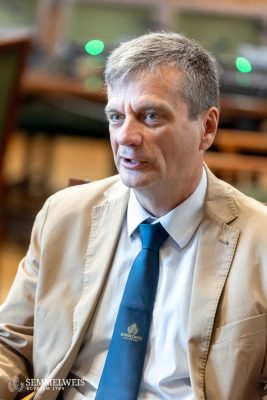 The new center aims to bring together and harmonize pharmacology and drug development activities between faculties and institutes, both in research and education, emphasized Dr. Péter Ferdinandy, Vice-Rector for Science and Innovations and President of the Center for Pharmacology and Drug Research & Development, which was established in the summer. As he explained, a review of the pharmacology courses at the university is still ongoing. The aim is to ensure that all faculties and institutes offering pharmacology courses provide students with the same state-of-the-art knowledge that is most applicable at the bedside. “As knowledge in this field is expanding particularly dynamically, a regular coordination forum is needed for faculties, individual institutes and clinics to ensure that we always teach the most up-to-date knowledge,” he added. Pharmacology is being taught in three faculties: the Faculty of Pharmaceutical Sciences, the Faculty of Medicine and the Faculty of Health Sciences.
The new center aims to bring together and harmonize pharmacology and drug development activities between faculties and institutes, both in research and education, emphasized Dr. Péter Ferdinandy, Vice-Rector for Science and Innovations and President of the Center for Pharmacology and Drug Research & Development, which was established in the summer. As he explained, a review of the pharmacology courses at the university is still ongoing. The aim is to ensure that all faculties and institutes offering pharmacology courses provide students with the same state-of-the-art knowledge that is most applicable at the bedside. “As knowledge in this field is expanding particularly dynamically, a regular coordination forum is needed for faculties, individual institutes and clinics to ensure that we always teach the most up-to-date knowledge,” he added. Pharmacology is being taught in three faculties: the Faculty of Pharmaceutical Sciences, the Faculty of Medicine and the Faculty of Health Sciences.
When harmonizing the subject, we take and transfer good practices from all organizational units, for example, the basics of pharmacology-related dietetics taught in the Faculty of Health Sciences are also relevant for medical doctors and pharmacists,
he pointed out. The Vice-Rector underlined the importance of the center in linking research industry partners more effectively with the relevant university actors, making it more transparent as to which projects the university can contribute its expertise to. As a member of the center, the recently established Richter Department will facilitate this, he added.
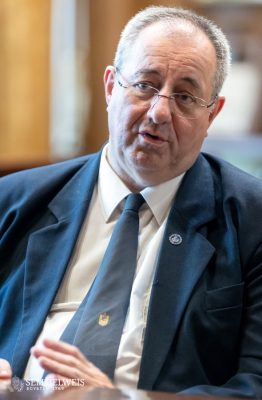 Dr. István Antal, Dean of the Faculty of Pharmaceutical Sciences and Co-President of the new center, also underlined that in addition to the ongoing review of education, this year a great emphasis will be placed on research and development. Several projects have been launched since the creation of the center, where results can be achieved by researchers from the Faculty of Pharmaceutical Sciences and the Faculty of Medicine pooling their knowledge. “Working together, learning about each other’s portfolios and ideas, and then working together to take them forward, is a huge resource. The new center will provide a forum for this,” he concluded.
Dr. István Antal, Dean of the Faculty of Pharmaceutical Sciences and Co-President of the new center, also underlined that in addition to the ongoing review of education, this year a great emphasis will be placed on research and development. Several projects have been launched since the creation of the center, where results can be achieved by researchers from the Faculty of Pharmaceutical Sciences and the Faculty of Medicine pooling their knowledge. “Working together, learning about each other’s portfolios and ideas, and then working together to take them forward, is a huge resource. The new center will provide a forum for this,” he concluded.
As an example, Dr. István Mándity, Head of the Department of Organic Chemistry, is working with the Institute of Pharmacology and Pharmacotherapy of the Faculty of Medicine on a patent related to the delivery of a new drug molecule into cells, and they have also started the development of a micro molecule for oncology. In addition, a project on transdermal drug delivery has recently been launched as a collaboration between the Faculty of Pharmaceutical Sciences and the institute.
The dean emphasized that with such collaborations, the faculty’s narrower, preclinical drug discovery and development field will be significantly improved, and with the introduction of this new approach, they could even take the development of a drug to the prototype stage: if an active substance is available, they can develop the suitable dosage and administration form for it, providing new impetus for the knowledge base gained from previous successes.
A huge advantage for pharmacology researchers at the Faculty of Medicine is that they can have direct contact to researchers from the Faculty of Pharmaceutical Sciences who can design and synthesize new molecules for a specific disease group, and the formulation knowledge crucial for innovative molecules is also available, the Vice-Rector added.
According to Dr. Péter Ferdinandy, this will complete the university’s drug development portfolio in the leading areas of expertise (cardiovascular drugs, oncology research, gastroenterology, endocrinology) and expand the university’s patent portfolio.
Pálma Dobozi
Translation: Judit Szabados-Dőtsch
Photo: Attila Kovács – Semmelweis University

